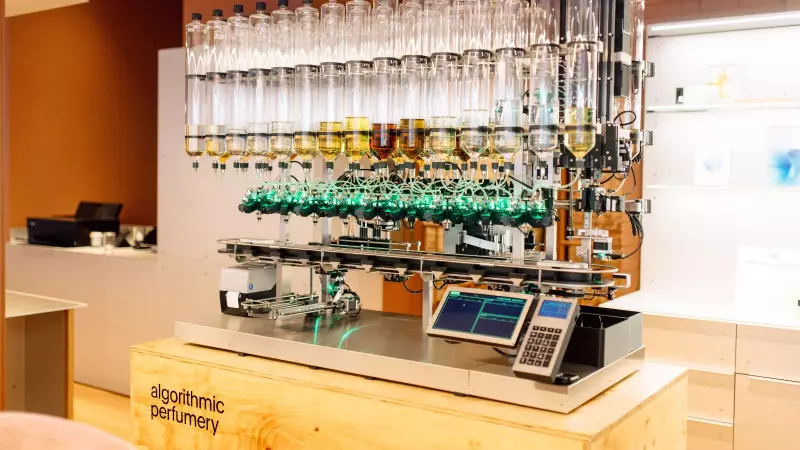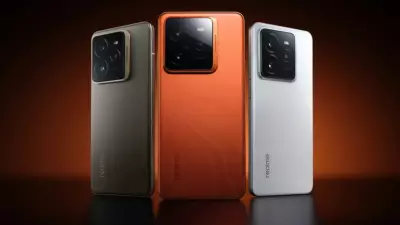
In a revolutionary development for the fragrance industry, an artificial intelligence-powered machine is now creating custom perfumes for consumers. The innovative installation, known as Algorithmic Perfumery, has made its appearance at 113 Spring, a wellness space located in New York's trendy SoHo neighborhood.
The Future of Fragrance Creation
The stainless steel-framed machine offers a mesmerizing spectacle as it whirs into action. After customers complete a detailed questionnaire about their personality and preferences, the device springs to life. Glass bottles travel along a conveyor belt while the machine dispenses precise amounts of various colored liquids - yellow, amber, and clear - from its gleaming glass dispensers. The final touch includes crimping on black spray pumps and printing personalized labels with the customer's name.
The entire experience costs $95 and lasts approximately 60 minutes, providing what many consider worth the price for the technological spectacle alone. Frederik Duerinck, the 49-year-old Dutch new media artist who founded tech startup ScenTronix in 2018, explained their vision: "We wanted to make something that would connect with the inner child in you."
Democratizing Scent Creation
Algorithmic Perfumery arrives at a time when fragrance is experiencing renewed interest, particularly among millennials and Generation Z consumers who are incorporating scent exploration into their self-care routines. The machine's creators aim to challenge the traditional $61 billion perfume industry by giving customers direct involvement in creating their signature scents.
Anahita Mekanik, the 55-year-old Iranian-born fragrance developer who heads scent design at ScenTronix, emphasized their mission: "We're giving people agency in the creative process" rather than having them settle for mass-produced options.
The project has received $1.8 million in venture capital funding and benefited from contributions by skilled coders and engineers. What began as a rudimentary apparatus in the Netherlands has evolved into sophisticated machines that now feature 54 cylindrical dispensers containing professional-grade ingredients.
Global Expansion and User Experience
Current Algorithmic Perfumery installations can be found at multiple international locations including a "living lab" in Breda, Netherlands (where ScenTronix is based), the Museum of the Future in Dubai, The Fragrance Shop on London's Oxford Street, and at 113 Spring in SoHo through February 2026.
The 113 Spring wellness boutique itself represents a new breed of retail stores that prioritize customer experiences alongside products. Located in a historic cast-iron building dating to the 1870s, the 3,000-square-foot space features a curving white fabric screen with drifting leaf projections and offers various wellness activities including movement classes and sound baths.
During the perfume creation process, customers answer 20 questions via QR code that help three different algorithms understand their personality and preferences. Questions range from "Which color represents you the best?" to "How would you describe your style?" The algorithms then work to pinpoint what the 113 Spring website describes as "emotional essence."
Of the 190,000 people who have engaged with Algorithmic Perfumery so far, 43% of those who left reviews rated at least one of their scents 93 or higher out of 100. However, only 8% have ordered refills, indicating there's room for improvement in creating truly memorable fragrances.
Continuous Innovation in Scent Technology
The machine learning system improves as more users participate and leave feedback. Duerinck acknowledged the challenges: "What we're trying to do is really hard." Despite this, the team continues to innovate, recently unveiling a larger machine with 300 glass dispensers at a beauty trade conference in Dubai.
The latest version has eliminated the phone questionnaire, allowing customers to simply describe what they want in a fragrance. "You can talk to it, confide in it and it will give you something back," Duerinck explained.
Looking toward the future, Duerinck shared his ambitious vision: "The end goal is to be able to 'scentify' a memory or really anything you describe." He recalled the comforting smell of cookies and coffee in his grandmother's kitchen, hoping the technology will eventually replicate such specific scent memories.
While AI has been making gradual inroads in the fragrance industry to speed up product development, human perfumers still maintain the final say in traditional settings. Algorithmic Perfumery represents a significant shift toward complete customer involvement in the creative process, potentially disrupting the established perfume industry with its army of experts, elaborate packaging, and aspirational marketing.





